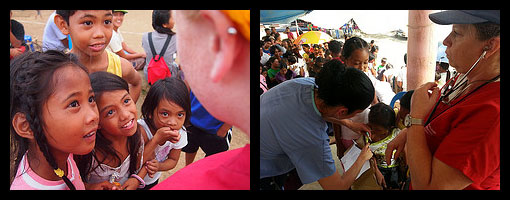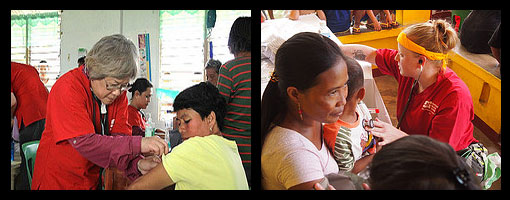Blog
RN Gift of Healing for the Holidays

NNU's Disaster Medical Relief Mission in the Philippines Continues – Caring for those in Harm’s Way
As the TV camera crews pack up in the Philippines and head out to the next daily headline, the nurses in red are still on the ground.

That’s the hallmark of the National Nurses United's Registered Nurse Response Network, says Bonnie Castillo, RN, director of RNRN, "we’re here to stay." In the past week, RNRN marked more comings and goings. As volunteers from our third delegation started home, a fresh deployment, team four arrived. And the next team is already in formation, heading out in early January, 2014.
In this holiday season, RNRN continues to invite public support for this vital project.
Tax deductible donations may be made at: www.SendaNurse.org

Team three, Castillo notes, spent their days providing hands on care on storm-ravaged Panay island, mostly in the City Health Office clinic in Roxas City, but also in mobile medical clinics in Estancia, in neighborhoods where the storm devastation was made even worse by a virulent oil spill.
To date, RNRN volunteers have cared for more than 1,400 patients in Roxas, providing wound care, giving shots, treating respiratory ailments, and providing critical stress debriefing for those who have lost their homes, their belongings, and their livelihoods.
While in Estancia, the nurses also assisted with the distribution of relief goods to impacted neighborhoods. They are seeing hundreds of patients, mostly children suffering from the debilitating effects of the spill and other primary care conditions, including post -traumatic stress.
"Our third team also worked to assess future possible deployment sites in Panay, Negros and Cebu as we continue our commitment, in the RNRN tradition, of deploying regular, rotating teams of RNs over an extended time frame to meet the long term needs," Castillo said.

Additional photos may be viewed on our Flickr channel at here >>
RNRN representatives also participated in a press conference in Estancia with our Global Nurses United partners, the Alliance of Healthcare Workers (AHW) and other community groups. It was called to heighten awareness to the environmental devastation and health hazards wrought by the oil spill, and to press the case for meaningful redress of the causes of climate change and responsible, immediate clean up of the oil spill.
“As nurses, we advocate for our patients. This is not confined to one country. The fabric of our foundation is patient advocacy as well as health equality and health access," said Jane Sandoval, RNRN volunteer from San Francisco. "Climate change and global warming has brought this misfortune to the Philippines. This affects us globally. From hurricane Katrina in the United States to typhoon Yolanda in the Philippines."
"The public health concerns for oil spills are many: asthma, heart disease, lung disease and cancer, shown through studies, are all leading to premature death," noted Ashley Forsberg, RNRN volunteer from Lansing, Mi. "These are the primary threats to humans and the oil spills further hinders a community’s economic livelihood and is devastating to your environment. Climate change is responsible for higher air temperatures which can increase bacteria-related food-borne poisoning such as salmonella and animal-borne diseases. Ground level ozone contaminants can damage lung tissue, reduce lung function and increase respiratory ailments. The people of the Philippines, whether in Tacloban, Roxas City or Estancia are living testament to that monumental threat."

The heartfelt voices of our RNRN volunteers tell the story of this incredible effort:
“Driving in the van on the way to the sites – everything from abandoned concrete buildings to churches to existing clinics to set up in and deliver care to areas with the greatest need – you see how the typhoon affected everything. Every one of these little towns we go to has had some serious tragedy. They are not part of the big tragedy everyone is hearing about but their situation is every bit as important as these locations that get the media attention. Acknowledgment of their situation is just so important. They are so moved that we care.” -- Jane Sandoval, RN, San Francisco, CA
“The disaster is on such a scale that when you think that over 12 million people are displaced from their homes right now. The casualties might have seemed small, but their livelihoods are in jeopardy. Fishermen who rely on the sea have lost their boats. Businesses have been destroyed. People are living hand to mouth. The nurse is the first one that's going to be there to hold your hand and figure out the whole picture of what's going on with you; the different aspects of your environment, be it your socio-economic situation, be it housing, be it financial, all of those things are things that nurses work with on a daily basis. We try to find roads through and around conditions and do whatever we can to get what's best for the patient.” – Ashley Forsberg, RN Lansing, MI
“Most common are upper respiratory infections. 80 percent of the people we see complain of cough and cold for an unusual amount of days. This is the result of the typhoon, and the aftermath, during which people disposed of debris by burning it as they try to rebuild. The youngest patient was one month old, the oldest patient was anyone in the Baranguy (districts or neighborhoods) who heard about us and just came to see the doctor because I'm sure they don't have easy access to healthcare or that might have been their first time seeing any doctors or nurses at all. They all have had issues ranging from a child with swollen foot with purulent discharge, to another patient, an elderly man, who was in hypertensive crisis, our intervention helped to save his life. One of the nurses caught that the heart rate of a baby was around 60 so she immediately brought the patient to the doctor. He said that if we hadn't caught it, an hour later the baby would have died.” -- Gandessa Orteza, RN, Burtonsville, MD
“This is why I got into nursing. The people here are so under-served and have been since before the typhoon. When the earthquake happened in Haiti, it was as if someone wanted us to know the people there needed help. Typhoon Yolanda has done the same thing. It has focused the world on people's needs here that existed long before the typhoon. We have received heartfelt thanks wherever we go.” – Betty Sparks, RN, Norwood, MA
“We were able to check on the oil spill (much of it from a barge of the National Power Corporation) that slammed into the shore during the typhoon. It hit two houses, which killed a mother and a baby right away. We were also able to distribute relief goods, and work with the Alliance of Healthcare Workers and another relief agency to distribute goods to the people. And we met many people who were directly affected by the oil spill. The marine environment is badly affected. You can see dogs walking with oil all over their legs. I even went in the compound of the National Power Company and asked how far the oil spill is, the oil is beyond the spill area, it is all over. On two of the coastal Baranguys, you would just see black gravel.” -- Girlie Garnada, RN, Port Richie, Fl.
“I talk to the children we see about the typhoon and tell them to draw where they were hiding when the typhoon came. A child sheltered in in a tree because the whole house was wiped out. For the small kids they aren't able to communicate much, they vent what they feel through drawing. One stood in front of the others and explained why they drew these pictures in front of the other kids and he was sobbing so hard. The children have PTSD from the trauma of the typhoon. So do some of the adults. There was a lady there who said she had insomnia, couldn't sleep, everything makes her jumpy, gets so scared. The trauma debriefing is about releasing emotions. We can't give any medications because they hardly have anything here, so instead we talk to them so that won't internalize and can release.” – Stella Auto, RN, Chicago, IL
“To have been part of the NNU’s RNRN project helping the victims of Typhoon Yolanda has been a true honor, an experience I would never trade for the world. We had the opportunity to assess and treat over 1,400 patients in six make-shift mobile clinics of different barangays of Panay Island, a few of which had never seen a medical mission in their town. Even with their broken homes and livelihood, they look strong, confident, and determined to rise again. Seeing them rebuild their homes gives me the comfort of knowing they will be okay. This isn't just about giving back. This is about helping change people's lives, changing the world one day at a time. It's definitely changed mine. We should continue to be inspired and do things we dream impossible or we will never know what could have been. During this journey I feel that I was part of healing over 1,000 souls. This to me is the beginning of my journey to healing the world. -- Melanie Crisologo, RN, Los Angeles